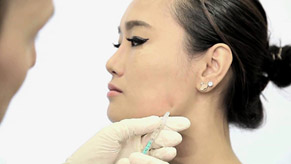Bruxism / TMJ Therapy
Temporomandibular joint (TMJ) disorders occur due to misalignment of the joint where the lower jaw meets the skull, when the teeth, facial muscles and TMJ are out of alignment the symptoms arise as Temporomandibular joint syndrome or dysfunction (TMD). Bruxism can be a symptom of TMD, conversely, TMJ disorder can cause Bruxism. Some symptoms can include, pain in the jaw muscles and joints, popping and or clicking sounds of the jaw when opening and closing, headaches, lock jaw, chewing surfaces of the teeth are flat or worn down, teeth sensitivity, grinding or clenching of the teeth, loose or broken teeth, crowns and bridges for no obvious reasons, and further bite problems.
Some treatment options may include Orthodontic treatment, custom occlusal mouthguards, teeth reconstruction, change in oral habits, anti-inflammatory/ muscles relaxant medication and Botox. Botox therapy is the latest alternative to traditional treatment for most people who experience bruxism, jaw tension or have a TMJ disorder.


